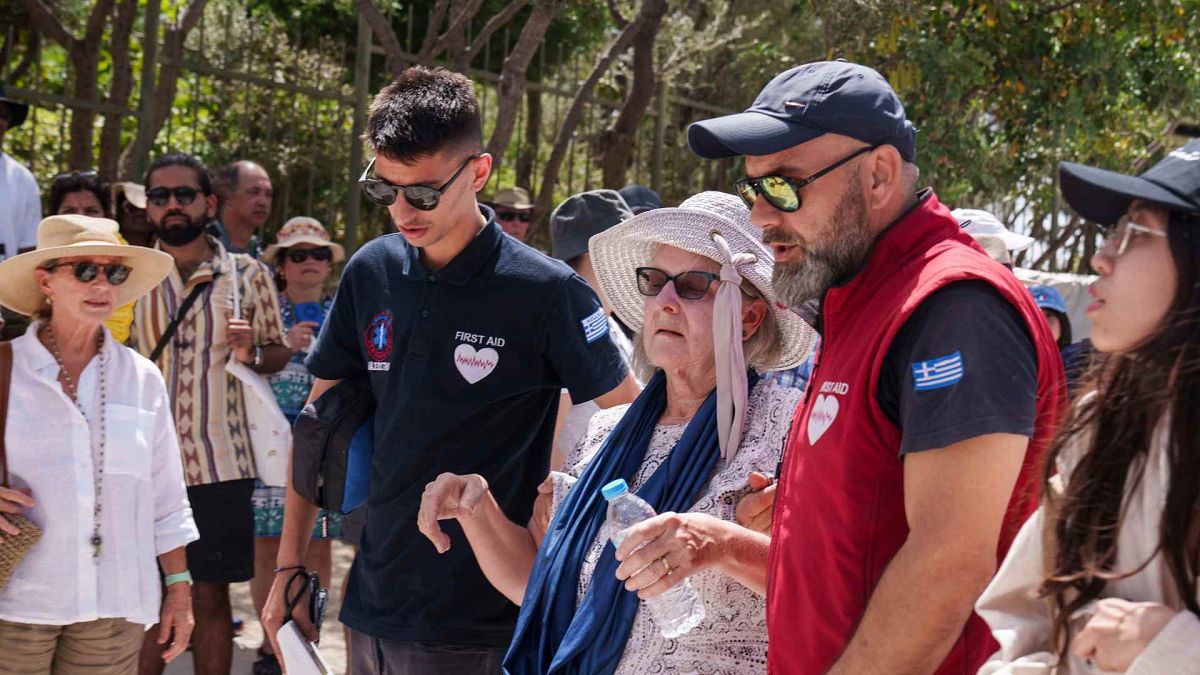Is it safe to travel to Greece? Athens shuts Acropolis amid heatwave

Tourists have been fainting while queuing to get into the Acropolis.
The Acropolis shut its doors to tourists today amidst a heatwave that has seen temperatures soar to 43 degrees celsius.
Greece’s most popular tourist attraction, the ancient Acropolis site, shut from 12-5pm today in a bid to keep visitors safe.
Local media have reported tourists fainting while queuing up to get into the site. 4 million tourists visited last year.
Athens is using drones to monitor temperatures across the city and plan the public health response.
Greece heatwave: How long will it last?
Greece is currently gripped by a heatwave which started last week.
The heatwave is believed to be driven by southerly winds bringing hot air and dust from North Africa.
Temperatures at the Acropolis today are reported to have reached 39 degrees celsius but they could go higher still, with the heatwave predicted to peak tomorrow (Thursday).
Cooler weather is expected late on Friday.
Greece is one of the most climate-impacted countries in Europe.
Last year, rising temperatures fuelled deadly wildfires and erratic rains caused some of the worst flooding on record, both of which damaged crops and livelihoods.
The Acropolis fights back against overtourism
The Acropolis has been trying to control visitors numbers for years.
Visitors have previously complained of overcrowding at the ancient site.
In 2023, authorities introduced a daily visitor cap of 20,000 per day and staggered entry times.
Are flights to Greece affected?
There are currently no reports of flight delays or cancellations due to the very hot weather.
As always, passengers should check airline and airport websites before leaving for the airport in case of any changes.
Authorities in Athens announced the closure of the Acropolis for five hours due to heat wave temperatures that also prompted many schools to close.
How else has Greece been affected by the heatwave?
Schools have been closed in parts of southern and central Greece where the temperatures were highest.
Athens authorities announced that garbage collection would also be halted for several hours today and that seven air-conditioned spaces would be opened to the public.
Is it safe to travel to Greece?
At present, no European governments have issue warning against travelling to Greece.
However heatwaves can be very dangerous, especially for more vulnerable populations such as babies, children and older people.
Experts recommend staying out of the sun during the hottest hours of the day, usually from 11am-4pm, covering up if you do need ot go outdoors and staying well-hydrated.
Related
Brits forced to pay fee to visit these 30 countries…
UK tourists will be required to pay a fee to visit 30 countries in Europe under new European Union (EU) travel rules.The rules mean British holidaymakers will n
The beautiful European island with just 148 locals
Irakleia is a beautiful island in the Minor Cyclades of Greece, nestled in the heart of the Aegean Sea and just an hour away from Naxos. Officially recorded t
Warning issued for Brits flying easyJet and Ryanair to popular…
Passengers flying with Ryanair, easyJet and British Airways should expect disruption (Picture: Urbanandsport/NurPhoto via Getty Images) Passenge










